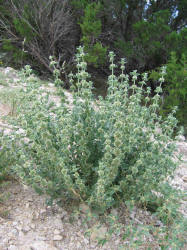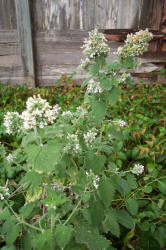Welcome to Catnapin's
White Wildflower Gallery
Bilateral Symmetry - Mint Family
_small.jpg)
_small.jpg)
_small.jpg)
_small.jpg)
_small.jpg)
_small.jpg)
Lamiaceae (Labiatae) - Mint family
Lacy Germander (Cut-leaf Germander) Teucrium laciniatum
Each flower about 3/4" long, white with variable purple stripes. They
grow in spirals up the stem so it looks like a larger flower, 4-6
blooms at a time. Leaves are deeply lobed, narrow
(laciniate). Cone shaped plants grow to about 8" tall.
Colonies Forms by rhizomes. Strong clove-like scent.
Photos taken in Taylor County, Texas, April-May 2004
(Native of Texas - Taylor, etc.)

_small.jpg)
_small.jpg)
_small.jpg)
_small.jpg)
Lamiaceae (Labiatae) - Mint family
Horehound (White Horehound) Marrubium vulgare
Flower balls about 1" wide. White bilateral flower about 3/16"
long. Plant stalks grow about 18" tall and likes to grow in
disturbed soil. The leaves and flowers have been used medicinally
for thousands of years, mostly for respiratory conditions. Its
popularity has facilitated its spread around the world.
Photos taken in Taylor County, Texas, July 2006
(Introduced, native of Eurasia, invasive - Taylor, Coleman, Brown, Coke)

_small.jpg)
_small.jpg)
_small.jpg)
Lamiaceae (Labiatae) - Mint family
Catnip (Catmint) Nepeta cataria
Flower clusters 1-2" long. Bilateral flower about 3/16" long, white with
purple spots. Plant stalks grow 2-3 feet tall. The leaves make a
herb tea. Leaves and shoots are used as seasoning. Nectar
makes good honey. Small birds like the seeds. The oil of
bruised plant attracts cats like an aphrodisiac.
Photos taken in Taylor County, Texas, June 2004
(Purchased, native of Asia - not listed as wild in my area)
Similar Species
Lemon Balm Melissa officinalis
This plant is often called Bee Balm (see purple mints). It is the mint use as garnish and
flavor foods. Flowers are small, like catnip.
(Introduced, native of Mediterranean - not listed as wild in Texas)
|
Also see:
red mint purple mint |